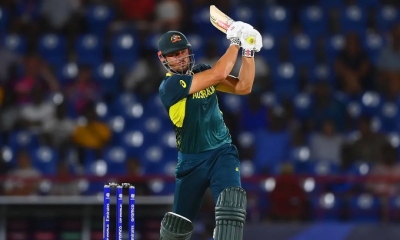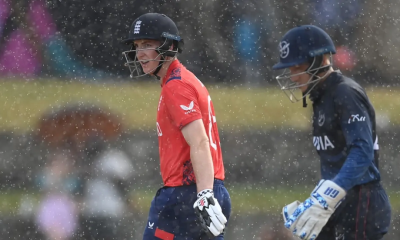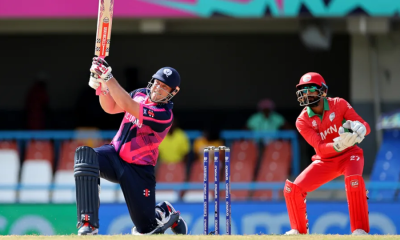Latest News
Australia blitz, Zampa guile leave England title defence in the balance
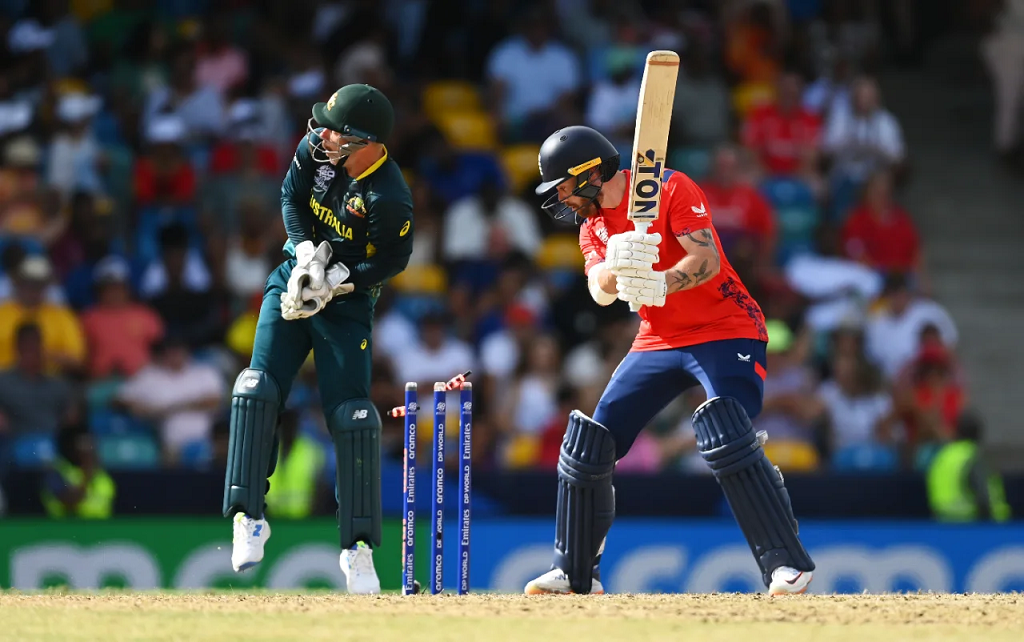
Australia outplayed England in Barbados to leave the defending champions sweating on their qualification for the Super 8s. They posted the highest score of the T20 World Cup to date after David Warner and Travis Head blitzed 70 runs in the first five overs, before Adam Zampa made the difference in England’s lacklustre run chase.
The result is not terminal for England’s title defence, but they have one point from their first two matches and face an anxious week ahead in Antigua. They will almost certainly need to beat both Oman (on Thursday) and Namibia (on Saturday), but even then would likely have to rely on net run rate to qualify for the second round ahead of Scotland.
The dimensions played a major role at Kensington Oval: one square boundary was nine metres shorter than the other, measured at just 58m. Australia targeted it, almost immediately. Will Jacks, surprisingly given the second over, conceded three sixes in his first four balls, all flying over the shorter leg-side boundary; Mark Wood’s first over from the same end also cost 22.
Australia’s total relied on cameos throughout their batting line-up rather than one substantial innings. Warner, likely facing England for the final time in international cricket, top-scored with 39 but everyone in their top five reached at least 28; Matthew Wade’s 10-ball 17 not out was another useful contribution from No. 7, taking Australia past 200.
England, by contrast, fell away badly after Zampa accounted for both of their openers – Jos Buttler and Phil Salt – inside his first 11 balls. They were 73 for 0 after seven overs but only managed 92 for 6 in the following 13, their middle order failing to adjust to a dry pitch quickly enough against a clinical Australian attack.
Wood took over from Jacks at the same end and his first over was equally as expensive: he tried to tuck Warner up and bowl to his sweepers, but instead fed his strengths and was cracked over the short side for three more sixes and a four. Moeen broke through when a ball skidded under Warner’s bottom edge, but only after conceding two fours and a six in his second over.
Jofra Archer was the quickest England bowler to adjust to the conditions, using his slower balls and dragging his length back, and could celebrate a first international wicket in Barbados when his offcutter burst through Head and hit middle and off stumps. Even still, Australia’s 74 for 2 was their highest powerplay at a men’s T20 World Cup.England started to drag things back when the field spread, though Mitchell Marsh continued to find the boundary. He nailed a pull over midwicket and onto the solar panels on the roof of a stand off Adil Rashid, and swung Archer over the leg-side boundary after the mid-innings drinks break.
Glenn Maxwell’s 28 off 25 was his joint-highest T20 score since February but he and Marsh fell within four balls of one another: Marsh was stumped by Buttler at the second attempt off Livingstone’s legspin, and Maxwell picked out deep midwicket off Rashid. At 142 for 4 in the 15th over, Australia needed a strong finish.
But Marcus Stoinis, Tim David and Wade ensured they reached 200 with regular boundaries at the back end and England became ragged in the field: Rashid threw his hands up in frustration when Stoinis picked up four from a toe-ended reverse-sweep, Archer and Jonny Bairstow leaving the ball to one another at point and backward point.
England’s openers looked to maximise the powerplay, with Buttler using his feet to target Josh Hazlewood and Salt launching a 106-metre six off his Kolkata Knight Riders team-mate Mitchell Starc. The seventh over, Starc’s third, then cost 19: Head caught Salt at deep third but while stepping on the boundary, and Buttler picked off a six then a four.
But on a dry surface, Zampa was the key bowler and struck with his first ball, which crashed into the top of Salt’s off stump as he looked to create room to cut. In Zampa’s second over, Buttler swung him down the ground for six but then reverse-swept straight to Pat Cummins at point, leaving 109 required off the final 10 overs.
Will Jacks cracked one boundary off Cummins but then picked out Starc at long-off, who took an excellent diving catch off Stoinis, and Bairstow looked short on rhythm throughout his 13-ball 7. Moeen briefly threatened something special, hitting three sixes in a Maxwell over, but the required rate proved insurmountable.
Brief scores:
Australia 201 for 7 in 20 overs (David Warner 39, Mitchell Marsh 35, Travis Head 34, Marcus Stoinis 30, Glenn Maxwell 28; Moeen Ali 1-18, Joffra Archer 1-28, Adil Rashid 1-41, Chris Jordan 2-44, Liam Livingstone 1-44) beat England 165 for 6 in 20 overs (Phil Salt 37, Jos Buttler 42, Moeen Ali 25, Harry Brook 20*; Pat Cummins 2-23, Adam Zampa 2-28, Josh Hazelwood 1-28, ) by 36 runs
[Cricinfo]
Foreign News
Deadly border fighting breaks out between Pakistan and Afghanistan
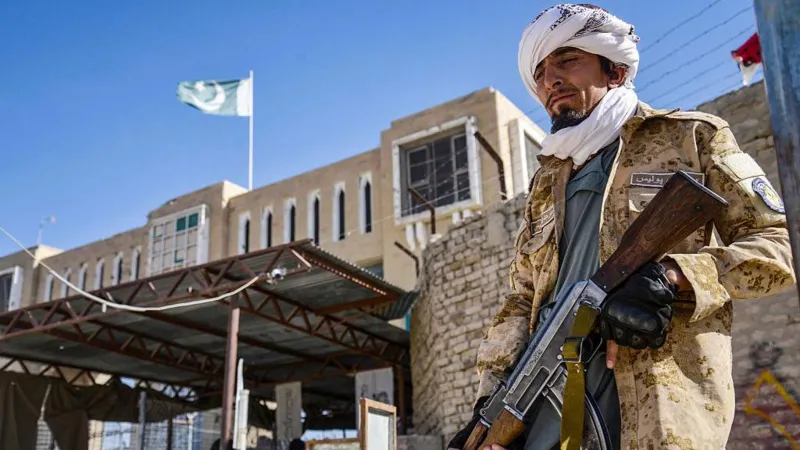
Border clashes have erupted again between Pakistan and Afghanistan’s Taliban forces, with each sides accusing the other of breaking a fragile ceasefire.
Residents fled the Afghan city of Spin Boldak overnight, which lies along the 1,600-mile (2,600 km) border between the two countries.
A medical worker in the nearby city of Kandahar told BBC Pashto that four bodies had been brought to a local hospital. Four other people were wounded. Three were reportedly wounded in Pakistan.
There has been sporadic fighting between the two countries in recent months, while Afghanistan’s Taliban government has also accused Pakistan of carrying out air strikes inside the country.
Both sides have confirmed they exchanged fire overnight but each blamed the other for initiating the four hours of fighting.
Mosharraf Zaidi, a spokesperson for Pakistan’s Prime Minister Shehbaz Sharif, accused the Taliban of “unprovoked firing”.
The statement continued: “An immediate, befitting & intense response has been given by our armed forces. Pakistan remains fully alert & committed to ensuring its territorial integrity & the safety our citizens.”
Meanwhile, a Taliban spokesperson said Pakistan had “once again initiated attacks” and said it was “forced to respond”.
Residents on the Afghan side of the border said the exchange of fire started at around 22:30 (18:00 GMT) on Friday.
Footage from the area showed a large number of Afghans fleeing on foot and in vehicles.
Ali Mohammed Haqmal, head of Kandahar’s information department, said Pakistan’s forces had attacked with “light and heavy artillery” and civilian homes had been hit by mortar fire.
The latest clashes came less than two months after both sides agreed to a ceasefire mediated by Qatar and Turkey.
It ended more than a week of fighting in which dozens were killed – the worst clashes between Pakistan and the Taliban since the group returned to power in 2021 – though tensions have remained high.
The government in Islamabad has long accused Afghanistan’s ruling Taliban of giving shelter to armed groups which carry out attacks in Pakistan.
The Taliban government denies the accusation and has accused Pakistan of blaming others for their “own security failures”.
The Pakistan Taliban have carried out at least 600 attacks on Pakistani forces over the past year, according to the Armed Conflict Location & Event Data Project.
Last week delegations from both sides met in Saudi Arabia for a fourth round of negotiations on a wider peace settlement, but did not reach an agreement.
Sources familiar with the talks told BBC News that both sides had agreed to continue with the ceasefire.
[BBC]
Latest News
Advisory for severe lightning for the Western and Sabaragamuwa provinces and Galle and Matara districts
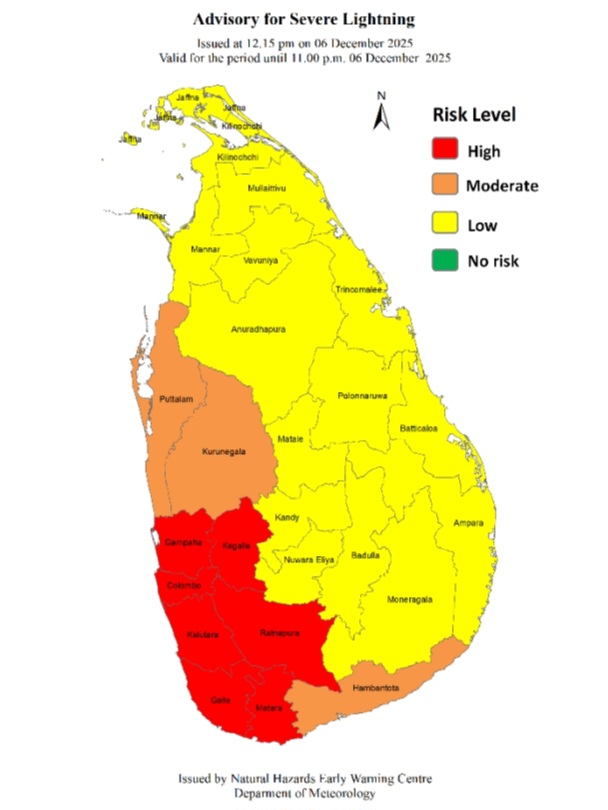
Advisory for Severe Lightning Issued by the Natural Hazards Early Warning Centre at 12.15 p.m. 06 December 2025 valid for the period until 11.00 p.m. 06 December 2025.
The public are being cautioned that thundershowers accompanied with severe lightning are likely to occur at some places in the Western and Sabaragamuwa provinces and in Galle and Matara districts.
There may be temporary localized strong winds during thundershowers.
The General public is kindly requested to take adequate precautions to minimize damages caused by lightning activity.
ACTION REQUIRED:
The Department of Meteorology advises that people should:
Seek shelter, preferably indoors and never under trees.
Avoid open areas such as paddy fields, tea plantations and open water bodies during thunderstorms.
Avoid using wired telephones and connected electric appliances during thunderstorms.
Avoid using open vehicles, such as bicycles, tractors and boats etc.
Beware of fallen trees and power lines.
For emergency assistance contact the local disaster management authorities.
Latest News
Justin Greaves 202*, Kemar Roach 58* anchor West Indies to epic draw
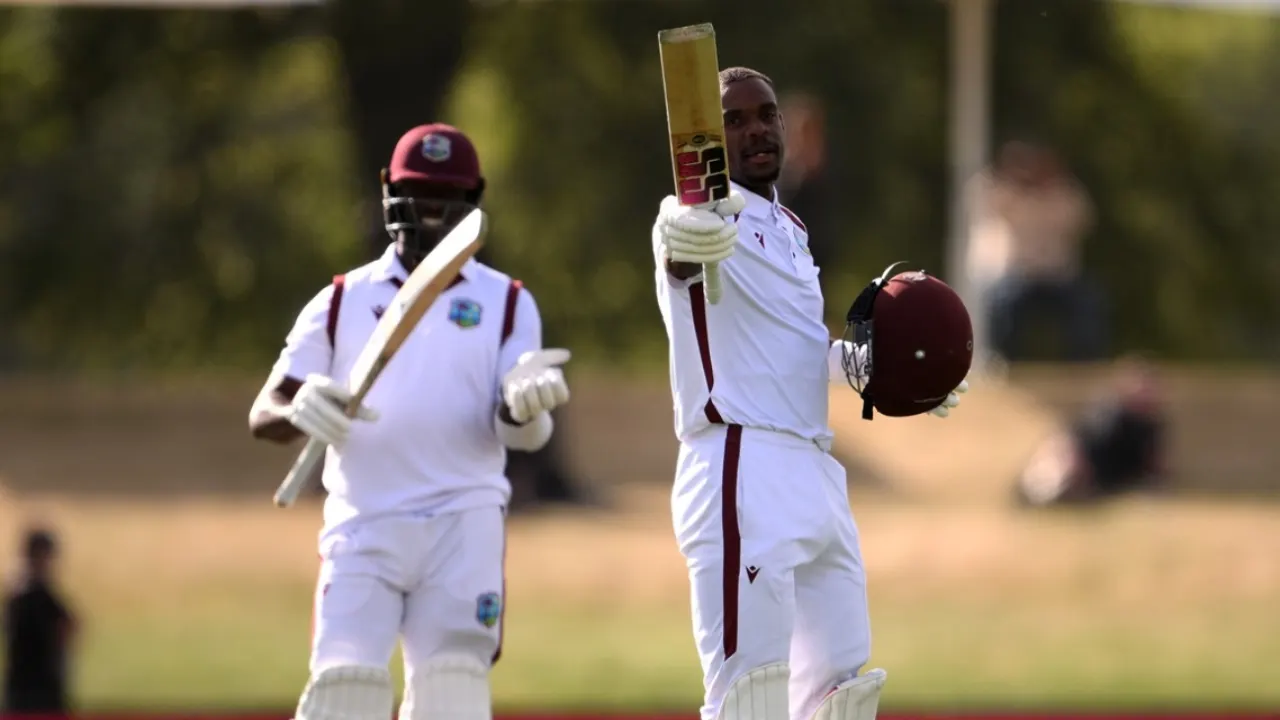
An epic stonewall from Justin Greaves had him face more than half the deliveries of his 12-Test career in this one innings alone, as West Indies pocketed their first points in their sixth Test of the 2025-27 World Test Championship cycle in Christchurch. The 163.3 overs they eventually faced is the longest fourth-innings in Tests for West Indies in 95 years.
Having played the supporting role to Shai Hope through their 196-run stand that rescued West Indies from 92 for 4 on Day 3, Greaves became the heartbeat of the innings once Hope (140) and Tevin Imlach fell in quick succession.
He brought up a stunning maiden Test double ton in the penultimate over when he sliced Jacob Duffy over backward point to pocket what was to be only his second boundary in all of the final session as his colleagues stood up to give him a standing ovation.
He finished 202 not out, having faced 388 deliveries, turning an innings that began with the typical artistic flair and flamboyance into a steely knock full of purpose and grit. Greaves wore more blows on the body than he could count, batted more deliveries than he had in his career, and reined in his natural instincts with single-minded purpose and determination.
His effort led to an astonishing turnaround from the first hour of the day, when West Indies stumbled to 277 for 6 in a mammoth chase of 531. A depleted New Zealand attack down to two weary frontline pacers in Zak Foulkes and Jacob Duffy, fancied their chances. But Greaves found an able ally in Kemar Roach, the 37-year-old veteran, who batted like his life depended on it in his comeback Test.
Roach made 58 not out – his highest first-class score – while facing 233 deliveries himself. Astonishingly, he made just 5 off the last 104 deliveries he faced during a dramatic final two hours of play even as the sun baked down hard on an increasingly docile Hagley Oval surface. Yet that should not take away from the epic rearguard from Hope, Greaves, and Roach.
The frustration of not being able to separate Greaves and Roach during the second and third sessions was evident, as New Zealand’s bowlers were ground into the dust. They would also have felt robbed when Roach appeared to have nicked Michael Bracewell to Tom Latham behind the stumps – though perhaps only having themselves to blame for burning all their reviews.
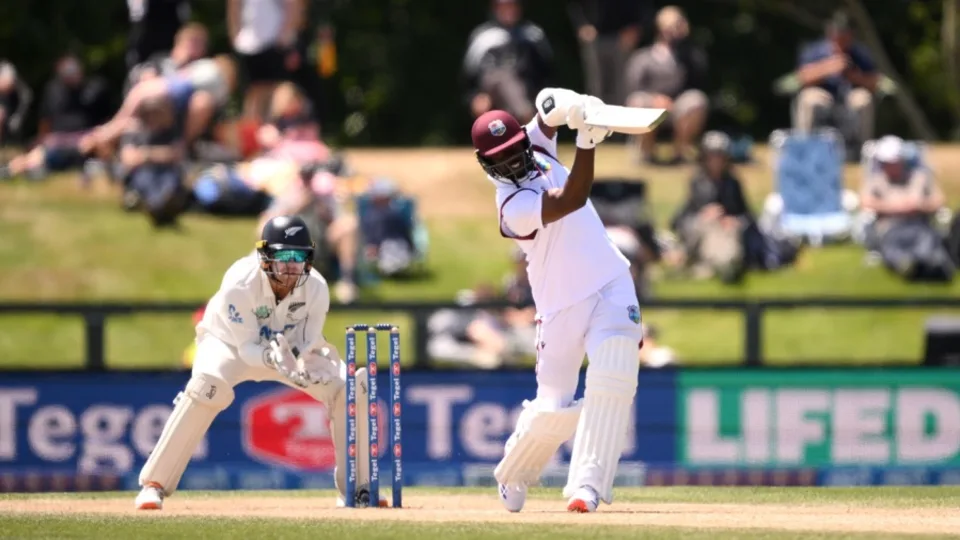
Even so, it was the thinnest of spikes that made it all the more challenging for Alex Wharf, the on-field umpire, who only a few minutes earlier made a cracking decision by turning down what everyone believed was an obvious inside-edge onto the pad to the slips, again off Bracewell. Replays showed Wharf had made a terrific call.
As admirably as Roach played, he also maximised his opportunities. On 30, he was put down by Foulkes at backward square leg when he attempted an expansive sweep off Bracewell. On 35, Blair Tickner, subbing for Matt Henry, missed a direct hit at the bowler’s end from a few yards away at short mid-on as Roach was misjudging a run.
Then on 47 came the most obvious chance, when Roach attempted to loft Bracewell had him nearly hole out to mid-on. Except, Glenn Phillips, the other sub, saw Tickner looking to intercept the ball from mid-off and palm it away.
With those three chances firmly behind him, Roach buckled down and offered a dead bat to anything that came his way against Bracewell. Foulkes and Duffy tried to ruffle him with the short ball from around the wicket, only for him to duck and weave.
Going into the final session, it became increasingly evident West Indies weren’t going to be enticed by the prospect of chasing down the 132 runs they needed in 31 possible overs. This clarity allowed them to approach the session with dead defence being the sole primary aim, even as Greaves began to tire and suffer cramps that needed medical attention at different times.
Not even the possibility of an impending double century enticed Greaves into attempting anything loose, even if Tom Latham gave him the open invitation to drive Bracewell against the turn through the covers. This wasn’t perhaps a risk not worth taking given how easily West Indies’ lower order collapsed in the first innings.
But long before a draw became the only possibility, even as New Zealand tried to attack with six fielders around the bat in the final session, Hope and Greaves pocketed runs at every available opportunity as the hosts rushed through their first six overs with part-time spin in a bid to take the second new ball quickly.
But even after they took it, there was hardly any assistance for the bowlers. Hope defended comfortably off a length with neither Foulkes nor Duffy consistently able to challenge the outside edge consistently. The occasional misfields, like – Rachin Ravindra letting one through his legs for four, or Will Young overrunning a throw while backing up – added to the sense of raggedness New Zealand had begun to feel.
A breakthrough lifted them shortly after drinks when Duffy dug in a short ball down leg, which Hope gloved behind, only for Latham to throw himself to his left and pluck a stunner from his webbing to end a marathon. Then came a second when Imlach was trapped by a nip-backer.
They may have thought then it was just a matter of time. It could’ve been had they not reprieved Roach, but those reprieves proved even more costly given they only had two fast bowlers and two part-timers available – all of them going full throttle to the limit – despite not getting much out of the surface.
In the end, the manner in which West Indies earned the draw may prove far more valuable. Above all, it was a day that reminded everyone of the slow-burn magic only Test cricket could deliver.
Brief scores:
West Indies 167 (Shai Hope 56, Tagenarine Chanderpaul 5; Matt Henry 3-43, Zak Foulkes 2-32, Jacob Duffy 5-34) and 457 for 6 (Justin Greaves 202*, Shai Hope 140, Kemar Roach 58*; Jacob Duffy 3-122) drew with New Zealand 231 (Kane Williamson 52, Michaell Bracewell 47, Jayden Seales 2-44, Kemar Roach 2-47, Ojay Shields 2-34, Justin Graves 2-35) and 466 for 8 dec (Ravindra 176, Tom Latham 145; Kemar Roach 5-78, Ojay Shields 2-74)
[Cricinfo]
-

 News7 days ago
News7 days agoWeather disasters: Sri Lanka flooded by policy blunders, weak enforcement and environmental crime – Climate Expert
-
News4 days ago
Lunuwila tragedy not caused by those videoing Bell 212: SLAF
-

 News3 days ago
News3 days agoLevel III landslide early warning continue to be in force in the districts of Kandy, Kegalle, Kurunegala and Matale
-

 Latest News5 days ago
Latest News5 days agoLevel III landslide early warnings issued to the districts of Badulla, Kandy, Kegalle, Kurunegala, Matale and Nuwara-Eliya
-

 Features5 days ago
Features5 days agoDitwah: An unusual cyclone
-

 Latest News6 days ago
Latest News6 days agoUpdated Payment Instructions for Disaster Relief Contributions
-

 News18 hours ago
News18 hours agoA 6th Year Accolade: The Eternal Opulence of My Fair Lady
-

 Latest News6 days ago
Latest News6 days agoLandslide Early Warnings issued to the Districts of Badulla, Colombo, Gampaha, Kalutara, Kandy, Kegalle, Kurunegala, Matale, Moneragala, Nuwara Eliya and Ratnapura


